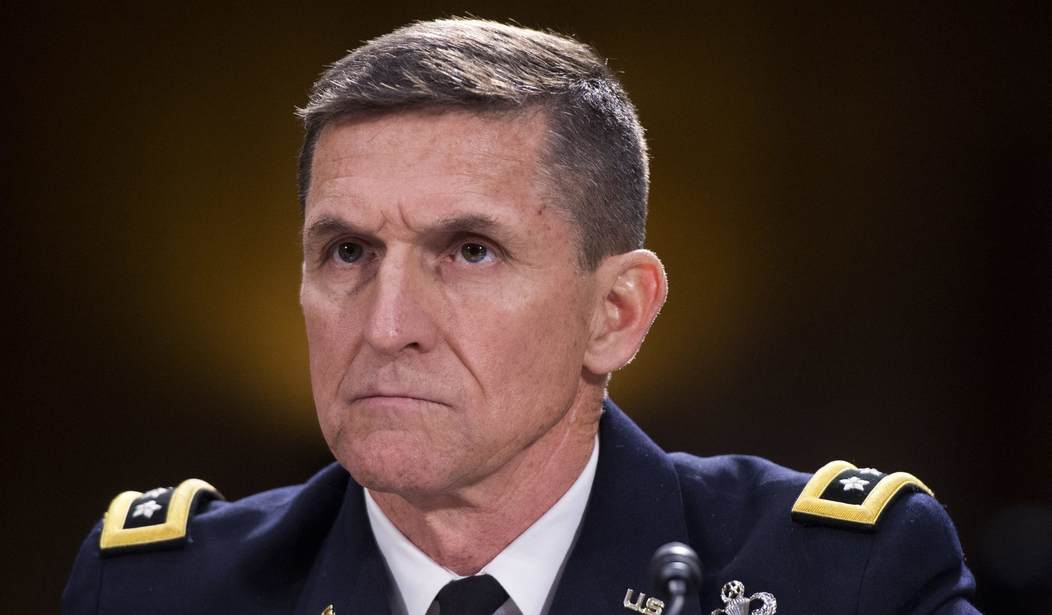Pursuant to a federal judge’s request, special counsel Robert Mueller on Friday released key documents related to the FBI’s questioning of former national security adviser Michael Flynn ahead of his sentencing on Tuesday.
U.S. District Judge Emmet G. Sullivan made the request on Thursday after a sentencing memo filed by Flynn’s defense team on Tuesday suggested he had been the victim of a perjury trap set up by the FBI in his January 2017 interview.
Flynn pleaded guilty to lying to the FBI about his contacts with the Russian ambassador late last year.
In the court filing, Flynn’s lawyers noted that he was interviewed without a lawyer present and was not told in advance that lying to the FBI was a crime. The memo also revealed that former FBI deputy director Andrew McCabe suggested that Flynn not have a lawyer present for his interview with FBI agents Peter Strzok and Joe Pientka.
The documents released on Friday confirm those claims. The 302 report also confirms that Strzok and Pientka “both had the impression at the time that Flynn was not lying or did not think he was lying.”
The agents’ impression that Flynn was not lying does not square with what fired FBI Director James Comey told House investigators during the closed-door testimony before the House Judiciary and Oversight committees last Friday. Comey recalled that “the conclusion of the investigators was he was obviously lying, but they saw none of the normal common indicia of deception: that is, hesitancy to answer, shifting in seat, sweating, all the things that you might associate with someone who is conscious and manifesting that they are being — they’re telling falsehoods. There’s no doubt he was lying, but that those indicators weren’t there.”
The special counsel argued in its filing Friday afternoon that “nothing about the way the interview was arranged or conducted caused the defendant to make false statements to the FBI.”
Yet the documents show that the decision to interview Flynn in early 2017 about contacts with the Russian ambassador was controversial within the Justice Department.
One FBI document said then-Acting Attorney General Sally Yates “was not happy” when then-FBI Director James Comey informed her that the FBI planned to talk to Flynn. The report also said several unnamed people back at FBI headquarters “later argued about the FBI’s decision to interview Flynn.”
It is easy to see why. There was nothing illegal about his phone conversation with former Russian ambassador Sergey Kislyak in December 2016, yet his identity in the wiretapped communication was unmasked, and the conversation leaked to the media. Then FBI agents, who already knew the answers because they’d read the transcript, rushed to the White House to ask questions about a perfectly legitimate phone call. What was the point, other than to set him up?
The documents include then-FBI Deputy Director Andrew McCabe’s notes after talking with Flynn to arrange his interview with the FBI. It also includes a so-called “302” report documenting what Flynn told anti-Trump agent Peter Strzok and one other agent during their conversation at the White House. That July 2017 report, though, specifically came from an interview with Strzok in which the Flynn encounter was discussed — and not the original Flynn interview. It was unclear why no “302” report from the interview itself was included.
That’s a problem because Judge Sullivan had requested all documents and memoranda related to Flynn’s questioning. Where’s the original 302 from January 24, 2017?
https://twitter.com/seanmdav/status/1073674808963952640
https://twitter.com/seanmdav/status/1073676956439375874
https://twitter.com/seanmdav/status/1073678651324014595
The report described Flynn as “unguarded,” saying he “clearly saw the FBI agents as allies.” It also stated Flynn discussed a number of “various subjects,” including things like hotels stayed in during the campaign, Trump’s “knack for interior design” and other issues unrelated to their inquiry.
“Flynn was so talkative, and had so much time for them, that Strzok wondered if the national security adviser did not have more important things to do than have a such a relaxed, non-pertinent discussion with them,” the report said.
Recalling how the interview came about, McCabe wrote in his memo that he told Flynn by phone on Jan. 24, 2017 he had a “sensitive matter to discuss” with him, and that he and Comey wanted to send two agents over to go over his contacts with Russians, amid media reports on the subject.
“He agreed and offered to meet with the agents today….I explained that I thought the quickest way to get this done was to have a conversation between him and the agents only,” McCabe wrote.
McCabe said he told Flynn that if he wanted to include lawyers from the White House counsel’s office, McCabe would “need to involve the Department of Justice.”
McCabe wrote: “He stated that this would not be necessary and agreed to meet with the agents without any additional participants.”
During a speech in Manhattan last weekend, Comey bragged that he had taken advantage of the disorganized first few days of the Trump administration to target Flynn. To the delight of his audience, he added that it’s not something he would have done to the administrations of George W. Bush or Barack Obama.
On Friday, Senate Judiciary Chairman Charles Grassley requested additional documents about the Flynn case from the Defense Intelligence Agency:
This letter from @ChuckGrassley is critically important, asking for declassification of DIA docs on General Flynn. Americans should be able to see these documents and get the full truth about General Flynn's involvement in this "collusion" investigation. The secrecy helps no one. pic.twitter.com/HQSZ1g4You
— Mark Meadows (@RepMarkMeadows) December 14, 2018
On Fox News Friday evening, the Washington Examiner’s Byron York noted that the original 302 from January 24 may have been handed over to Judge Sullivan under seal.
Judge Sullivan, a notoriously no-nonsense magistrate who frowns on prosecutorial overreach, is weighing how to sentence Flynn.









Join the conversation as a VIP Member